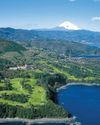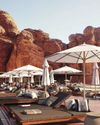
Arosa is the end of the line and is quite happy about it. When the train arrives at the Swiss station, visitors disembark for their holiday or day’s work and swap places with departing passengers. The Rhaetian Railway takes visitors up the 26km line from Chur to Arosa in an hour, the distinctive red train making light work of the 1,000-metre climb, hugging the mountainside as it disappears into tunnels (19 of them) to reappear on bridges spanning gorges (there are 52 bridges).
If you are driving to the resort, the Schanfigg road from Chur to Arosa, which was completed in 1890, has, perhaps apocryphally, 365 turns on its way to the top. The fact that there is nowhere beyond Arosa means that for both the railway and the road, there is no through traffic and, once there, the compact town, with its hotels, shops and attractions gathered around two lakes, doesn’t require further car use. Buses around the town are free.
The population is only about 2,000 in summer, doubling in winter, so Arosa has a reputation for being quieter and more family-orientated than other resorts. Nightlife isn’t the attraction here. What you get, instead, is that peaceful feeling every evening, particularly since most vehicles are forbidden from being driven between midnight and 6am, and during the day you’re as likely to hear the bells on the horse-drawn carriages taking tourists around the town as you are a vehicle (it helps that the buses are electric or hybrid).
So what’s special about Arosa? Well, its setting, to begin with. It sits at about 1,800 metres above sea level, yet its location at the bottom of a wide valley means it is both sunny and sheltered from the strongest winds. By the end of the 19th century, it had become a popular spa resort – hence the building of the railway, which opened in 1914 – and as winter sports increased in popularity in the decades afterwards, it added a winter season to the summer.
Diese Geschichte stammt aus der February 2021-Ausgabe von Business Traveller Middle East.
Starten Sie Ihre 7-tägige kostenlose Testversion von Magzter GOLD, um auf Tausende kuratierte Premium-Storys sowie über 8.000 Zeitschriften und Zeitungen zuzugreifen.
Bereits Abonnent ? Anmelden
Diese Geschichte stammt aus der February 2021-Ausgabe von Business Traveller Middle East.
Starten Sie Ihre 7-tägige kostenlose Testversion von Magzter GOLD, um auf Tausende kuratierte Premium-Storys sowie über 8.000 Zeitschriften und Zeitungen zuzugreifen.
Bereits Abonnent? Anmelden

Onwards and upwards
In an exclusive interview with Ian Fairservice for Business Traveller, His Highness Sheikh Ahmed bin Saeed Al Maktoum, President of the Dubai Civil Aviation Authority and CEO and Founder of the Emirates Group, provides insight into the current and future state of travel and Emirates’ pivotal role in getting the industry back on track

Cleaning up the crisis
How hotels have risen to the challenge of keeping guests safe during the pandemic

The Great Vegas Meetings Magic Act
The city is working hard to conjure up events and make millions of visitors reappear

TAKES OFF
Corporations are seeking new travel solutions that put safety and convenience first

TEE TIME IN TOKYO
The Tokyo Olympics may be delayed, but the golf courses around Japan’s capital aren’t slowing down

KEYS TO THE KINGDOM
New and upcoming hotels to check out when you next visit Saudi Arabia

QATAR CALLING
A swathe of hotels are opening in the Gulf State in the run-up to the 2022 FIFA World Cup

MEMPHIS CON BRIO
Music and history flood through the heart and soul of this quintessential American river town

Sofitel Mumbai BKC
BACKGROUND Sofitel Mumbai BKC is one of Accor’s most prominent addresses in Mumbai, Maharashtra. The French hospitality group’s other hotels in the city are operated under the Novotel and ibis brands.

Taking Scotland in Stride
A walk through the Highlands and Borders is the best way to touch this country’s history and nature